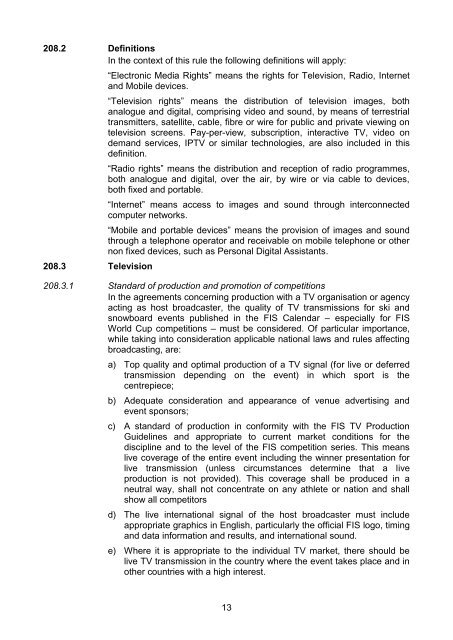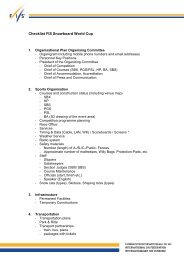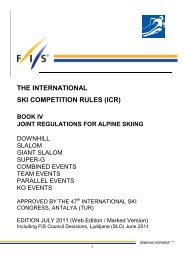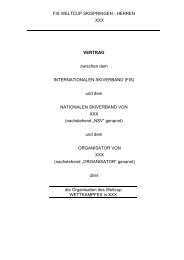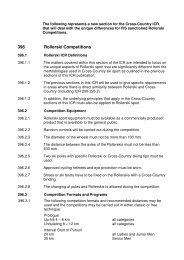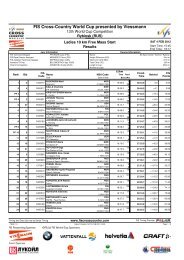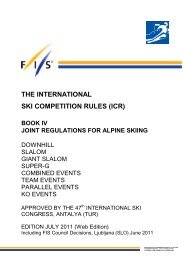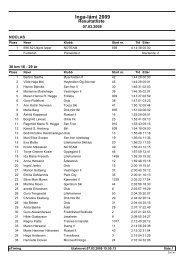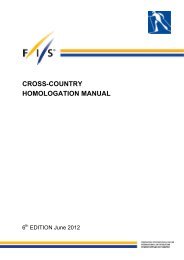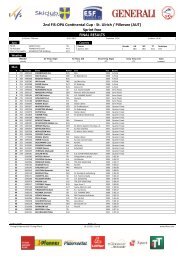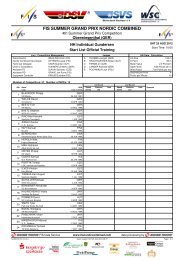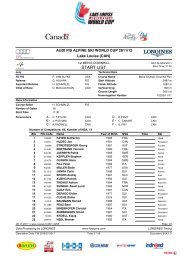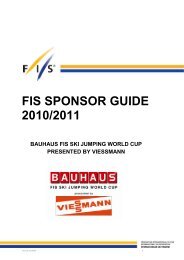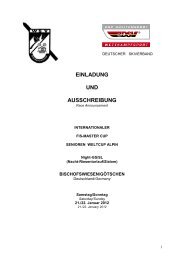THE INTERNATIONAL SKI COMPETITION RULES (ICR) BOOK II - Fis
THE INTERNATIONAL SKI COMPETITION RULES (ICR) BOOK II - Fis
THE INTERNATIONAL SKI COMPETITION RULES (ICR) BOOK II - Fis
Create successful ePaper yourself
Turn your PDF publications into a flip-book with our unique Google optimized e-Paper software.
208.2 Definitions<br />
In the context of this rule the following definitions will apply:<br />
208.3 Television<br />
“Electronic Media Rights” means the rights for Television, Radio, Internet<br />
and Mobile devices.<br />
“Television rights” means the distribution of television images, both<br />
analogue and digital, comprising video and sound, by means of terrestrial<br />
transmitters, satellite, cable, fibre or wire for public and private viewing on<br />
television screens. Pay-per-view, subscription, interactive TV, video on<br />
demand services, IPTV or similar technologies, are also included in this<br />
definition.<br />
“Radio rights” means the distribution and reception of radio programmes,<br />
both analogue and digital, over the air, by wire or via cable to devices,<br />
both fixed and portable.<br />
“Internet” means access to images and sound through interconnected<br />
computer networks.<br />
“Mobile and portable devices” means the provision of images and sound<br />
through a telephone operator and receivable on mobile telephone or other<br />
non fixed devices, such as Personal Digital Assistants.<br />
208.3.1 Standard of production and promotion of competitions<br />
In the agreements concerning production with a TV organisation or agency<br />
acting as host broadcaster, the quality of TV transmissions for ski and<br />
snowboard events published in the FIS Calendar – especially for FIS<br />
World Cup competitions – must be considered. Of particular importance,<br />
while taking into consideration applicable national laws and rules affecting<br />
broadcasting, are:<br />
a) Top quality and optimal production of a TV signal (for live or deferred<br />
transmission depending on the event) in which sport is the<br />
centrepiece;<br />
b) Adequate consideration and appearance of venue advertising and<br />
event sponsors;<br />
c) A standard of production in conformity with the FIS TV Production<br />
Guidelines and appropriate to current market conditions for the<br />
discipline and to the level of the FIS competition series. This means<br />
live coverage of the entire event including the winner presentation for<br />
live transmission (unless circumstances determine that a live<br />
production is not provided). This coverage shall be produced in a<br />
neutral way, shall not concentrate on any athlete or nation and shall<br />
show all competitors<br />
d) The live international signal of the host broadcaster must include<br />
appropriate graphics in English, particularly the official FIS logo, timing<br />
and data information and results, and international sound.<br />
e) Where it is appropriate to the individual TV market, there should be<br />
live TV transmission in the country where the event takes place and in<br />
other countries with a high interest.<br />
13


